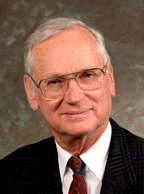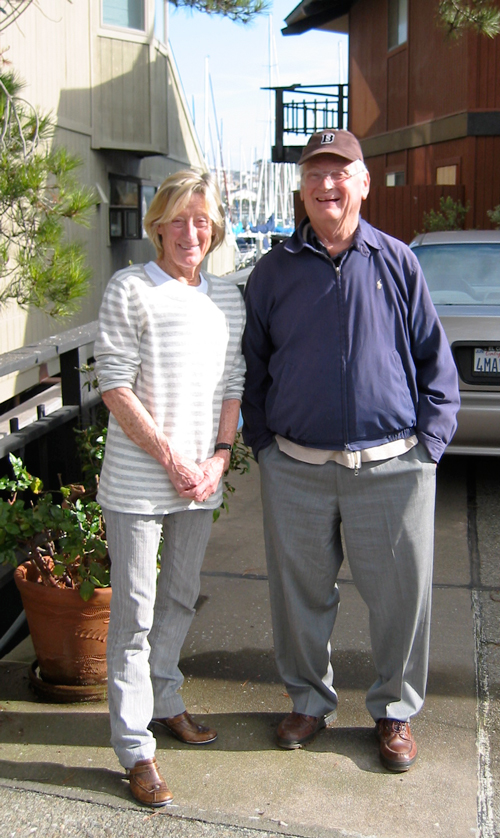Kenneth Crowe, a widely traveled physicist and a demanding, inspirational teacher at Lawrence Berkeley National Laboratory (Berkeley Lab) and the University of California at Berkeley, died February 1, 2012, at the age of 85.
Crowe was born in Boston in 1926. While working summers for his parents at a nearby resort he developed a life-long love of sailing. He was also a precocious student, skipping senior year in high school to enter Brown University, where in 1948 he earned his bachelor’s degree in science. In 1952 he received his Ph.D. from UC Berkeley, having taken courses from Emilio Segrè, with both Luis Alvarez and Wolfgang Panofsky serving on his doctoral committee. He was a research associate at Stanford University’s Hansen Laboratories of Physics until 1956, when he joined UC’s Lawrence Radiation Laboratory – informally known as the Rad Lab, now Berkeley Lab.
In 1957 Crowe coauthored an influential textbook, The Fundamental Constants of Physics, with E. Richard Cohen and Jesse DuMond, and a year later joined the UC Berkeley physics faculty as a professor of physics. He continued at both Berkeley Lab and UC Berkeley for over 30 years, while pursuing his interest in medium energy physics and related studies, with particular attention to muon physics – fields he pioneered and is considered to have defined.
Crowe’s forte was small-scale experiments of fundamental importance. Early on, much of his research could be performed at Berkeley Lab’s 184-Inch Cyclotron, while later he and his students and colleagues pursued projects at “meson factories” like the Los Alamos Meson Physics Facility in New Mexico, LAMPF (now LANSCE); TRIUMF in Vancouver, B.C.; and the Swiss Institute for Nuclear Physics, now the Paul Scherrer Institute (PSI). Beams of muons, the heavy and short-lived cousins of electrons, have excellent qualities for exploring the properties of molecules and materials, and muons also have the peculiar ability to catalyze nuclear fusion at low temperatures: replacing electrons in hydrogen molecules, their extra mass encourages the nuclei to fuse readily.
Crowe was a leader in investigating these phenomena and their underlying principles. Many of his students and postdocs from the United States and other countries sought him out in Berkeley or were lucky enough to make his acquaintance here, and are now leaders in such fields as muon spin rotation and muon-catalyzed fusion. Beyond muons, medium energy physics embraces many other areas, and in the 1980s Crowe, together with European collaborators, conceived an experiment for the Low Energy Antiproton Ring (LEAR) at CERN called the Crystal Barrel, used to test the fundamental theory of nuclear physics, quantum chromodynamics (QCD). His work involved searching for exotic QCD states in relatively unexplored lower-energy regions.
The Crystal Barrel experiment lasted several years, and during that time Crowe and his wife, Penny, lived across the border from CERN headquarters in the French countryside, a home fondly remembered by his colleagues, not least for Penny’s bouquets of wildflowers and her excellent cooking. In California the cooking was just as memorable, where home was a hexagonal house on stilts, on the waterfront in Point Richmond; Crowe built it himself from a kit and kept his boat tied to the rail.
Crowe’s former students are consistent in remembering their mentor as a perfectionist whose respect was hard to win but, once won, whose loyalty and generosity were boundless. This was as true on the water as in the laboratory. A fiercely competitive yachtsman, he sailed his 5.5-meter sloop for the Richmond Yacht Club but insisted on crewing it with landlubberly students and postdocs who couldn’t tell a sheet from a painter; even when they got the skipper in trouble with race officials, they would be treated to a drink at the bar once safely back onshore.
Perhaps to offset the high anxiety of racing or, on the contrary, perhaps to raise the stakes, Crowe took up playing the cello after his retirement and became skillful enough to perform in a number of recitals.
Crowe was a Fellow of the American Physical Society, was named a Fellow of the Japan Society for the Promotion of Science in 1980, was awarded the Humboldt Senior Scientist Award in 1987, and was a Scientific Associate in the CERN Fellowship Program from 1990-1991.
Kenneth Crowe is survived by his wife, Penny, and his children Christina, Laura, Gabrielle, Cathy, Timothy, Jeffrey, and stepchildren Michael and Karen. A memorial will be held on March 17 from 3:00 to 5:00 p.m. at the Unitarian Church, 1 Lawson Road, Kensington, CA. In lieu of flowers, donations may be made to an annual fund at Brown University. Contact [email protected] for more information.

